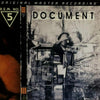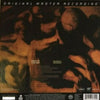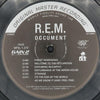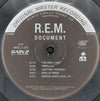









R.E.M. – Document (Ultra Analog, Half-speed Mastering)
ORDER LIMITED TO ONE ITEM PER CUSTOMER
Bill Berry – drums, backing vocals
Peter Buck – guitar, dulcimer on "King of Birds"
Mike Mills – bass guitar, keyboards, backing vocals
Michael Stipe – lead vocals
Steve Berlin – horns on "Fireplace"
Carl Marsh – Fairlight CMI synthesizer on "Fireplace"
Written by Bill Berry Peter Buck, Mike Mills and Michael Stipe except A5 written by Bruce Gilbert, Graham Lewis, Colin Newman, Robert Grey
1 LP, gatefold jacket
Limited numbered edition
Original analog Master tape : YES
Half-speed Mastering
Gain 2™ Ultra Analog
Heavy Press : 180g
Record color : black
Speed : 33 RPM
Size : 12'’
Stereo
Studio
Record Press : RTI
Label : MOFI
Original Label : IRS
Recorded March–May 1987 at Sound Emporium, Nashville, Tennessee
Engineered by Steve Catania, Tom Der, Toni Greene, Gary Laney, Ted Pattison, Todd Scholar
Produced by Scott Litt, R.E.M.
Mastered by Krieg Wunderlich
Originally released in September 1987
Reissued in October 2012
Tracks:
Side A:
- Finest Worksong
- Welcome to the Occupation
- Exhuming McCarthy
- Disturbance at the Heron House
- Strange
- It's the End of the World as We Know It (And I Feel Fine)
Side B:
- The One I Love
- Fireplace
- Lightnin' Hopkins
- King of Birds
- Oddfellows Local 151
Awards:
Rolling Stone 500 Greatest Songs of All Time - Ranked 426/500
Slant Magazine’s list of "Best Albums of the 1980s – Ranked number 17
Reviews :
“R.E.M. began to move toward mainstream record production on Lifes Rich Pageant, but they didn't have a commercial breakthrough until the following year's Document. Ironically, Document is a stranger, more varied album than its predecessor, but co-producer Scott Litt -- who would go on to produce every R.E.M. album in the following decade -- is a better conduit for the band than Don Gehman, giving the group a clean sound without sacrificing their enigmatic tendencies. "Finest Worksong," the stream-of-conscious rant "It's the End of the World as We Know It (And I Feel Fine)," and the surprise Top Ten single "The One I Love" all crackle with muscular rhythms and guitar riffs, but the real surprise is how political the mid-tempo jangle pop of "Welcome to the Occupation," "Disturbance at the Heron House," and "King of Birds" is. Where Lifes Rich Pageant sounded a bit like a party record, Document is a fiery statement, and its memorable melodies and riffs are made all the more indelible by its righteous anger. In other words, it's not only a commercial breakthrough, but a creative breakthrough as well, offering evidence of R.E.M.'s growing depth and maturity, and helping usher in the P.C. era in the process.” AllMusic Review by Stephen Thomas Erlewine
Ultra Analog™ : The GAIN 2 Ultra Analog™ Series stems from the use of the Gain 2 system, mastered at half speed from the original master tapes where possible, capturing and uncovering as before undiscovered sonic information.
Half-speed mastering. In half-speed mastering, the whole process is slowed down to half of the original speed. A typical 33 1/3 rpm record is cut at 16 2/3 rpm. The source material is also slowed down (reducing the pitch in the process) meaning the final record will still sound normal when played back. Slowing the whole process down allows more time, which means the end result sounds better and is more efficient — allowing engineering to minimize the effects of inherent limitations within the vinyl format. The result is a more accurate and more open high-frequency response in the half speed vinyl when compared with a normal speed recording.
Ratings :
AllMusic : 4.5 / 5 ; Discogs : 4.67 / 5

